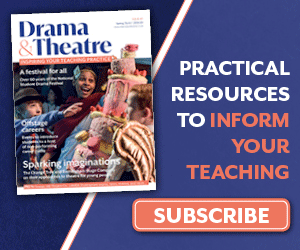On Wednesday 25th January, National Drama spoke at the House of Lords at the Children’s Media and Arts APPG, to fiercely represent Drama along with other Drama representatives, young people, and Baroness Floella Benjamin.
Here is Dr Geoff Readman’s speech in full:
Good afternoon. I am delighted to have this opportunity to represent Drama in schools and to present the case for Drama as a Foundation Subject; one in which Drama would have equal status to Music and Art in primary, secondary, special needs and alternative education provision.
Tianna and Noah have already made some profound points about learning through Drama. To quote:
Tianna: ‘a pathway to explore different perspectives raising awareness on social and political issues; friendships and racism’.
Noah: ‘…with Drama I find a freedom … a subject where my imagination can run wild … I can feel equal with my peers…’
In presenting my case, I too will argue that Drama is an empowering and collaborative art form. At its heart is the unique process of ‘enactment’. It is the basis of a social art form that stems from the inherent human ability to place oneself in the role of someone, or something, else, within an agreed context.
Drama provides opportunities for children and young people to negotiate meaning and to articulate the kind of future world that they want to see.
The learning potential of Drama is internationally recognised for its contribution to the development of a healthy, creative and democratic society. Theatre-making, children’s play, role-taking, rituals, digital and fictional narratives, social game-playing and the study and performance of written texts are all inherently part of the human capacity to make sense of the world through imagined experience.
Drama is a statutory requirement in: Australia, Finland, South Africa, New Zealand, Iceland, Canada.
Why, then, in England, is Drama and theatre so frequently placed at the bottom of an arts hierarchy?
Why has there been an 18% reduction in Drama teachers since 2010?
Why have examination entries fallen by 35%?
A reduction from 81,000 in 2010 to 52,000 in 2022?
I’m going to suggest that many of the following factors indicate why this might be the case:
Primary
Whilst there is excellent practice in some primary schools, the majority are struggling to deliver anything more than the annual school production and nativity play. There is a shortage of subject specialism; finance makes theatre visits problematic and the over-riding emphasis on assessment and testing reduces time and energy for high quality teaching; particularly in respect of the arts.
Secondary
At secondary level, the introduction of Ebacc and STEM has created a subject hierarchy; one that has again marginalised Drama and Theatre education. Schools are designing their Drama curriculum around the syllabus requirements of the four Examination Boards.
Many schools now ask young people to make their options in Year 8 in order that longer can be spent on GCSE. In some cases, they are making option choices at 12!
Further, I suggest the very identity of drama and theatre as a practical arts process is being undermined by written work and assessment. 70% at GCSE – 60% at A Level.
It often appears that the word ‘academic’ is only achievable through the written word. Imagine the response of generations of theatre artists to that concept. It is the practice of Brecht, Frantic Assembly and Boal that is important.
Teacher Education
This is a matter of serious concern; one which is threatening both theoretical and practical innovation. Learning how to teach drama requires more than ‘subject knowledge’. It also needs well-resourced courses that are taught by experienced and well-qualified practitioners.
The proliferation of ‘school-based’ routes into teaching, with their focus on the practice of one or two schools and a curriculum based largely on theatre practitioners is resulting in a narrow training experience. Early Careers Teachers need to engage in practical work that exemplifies key aspects of pedagogy and theory.
High quality Teacher Education requires time for practical exploration, critical reflection and the assimilation of relevant theory and research.
Why will making Drama a Foundation Subject make a difference?
- It will help to address the unfairness of the subject status that exists in the arts hierarchy. It will ensure that all children and young people have opportunities to learn about and through drama and theatre within a broad and coherent curriculum.
All children have an entitlement to all arts subjects, in equal measure.
- Although it will require increased funding, it is time to end inequality. Independent schools often provide lavish resources for Drama and theatre. Eton and Harrow each have more than one theatre. A scan of independent school websites make it apparent how highly Drama is valued. Interestingly, in the programme for Jerusalem, Sir Mark Rylance also questions this inequality in relation to the future of the acting profession.
- As long as Drama is described in a single paragraph and located within the English curriculum, I am not sure that Ofsted will begin to report on teaching and learning in Drama. At the moment, there is virtually no evidence of Ofsted Drama Research Reports or evaluations of primary or secondary curriculum Drama. Ironically, many Drama teachers would welcome the opportunity to share their pedagogy.
- Foundation subject status will highlight the urgent need for specialist Drama teachers with appropriate subject knowledge, professional support and relevant training. This must include teachers who are in SEND education and mark the end of their professional isolation.
- It could also bring to an end the unacceptable practice of one-person departments teaching an entire school, without the resources and energy to teach effectively.
In conclusion
This rational is based on educational, artistic and social criteria. There is also an abundance of academic research that argues for the benefits of Drama. The potential of Drama learning is the significant matter today, not the current state of the economy. The importance of learning through Drama should not be defined by economic policy. It is our children and young people’s educational future that is at stake. Implicit in that future is a responsibility on all of us to provide them with an opportunity to celebrate their diversity and to make their academic, social and cultural identity central to their learning process.
In my opinion: a) curriculum review, b) investment and c) action is required; urgently.
Geoff Readman
Chair National Drama




